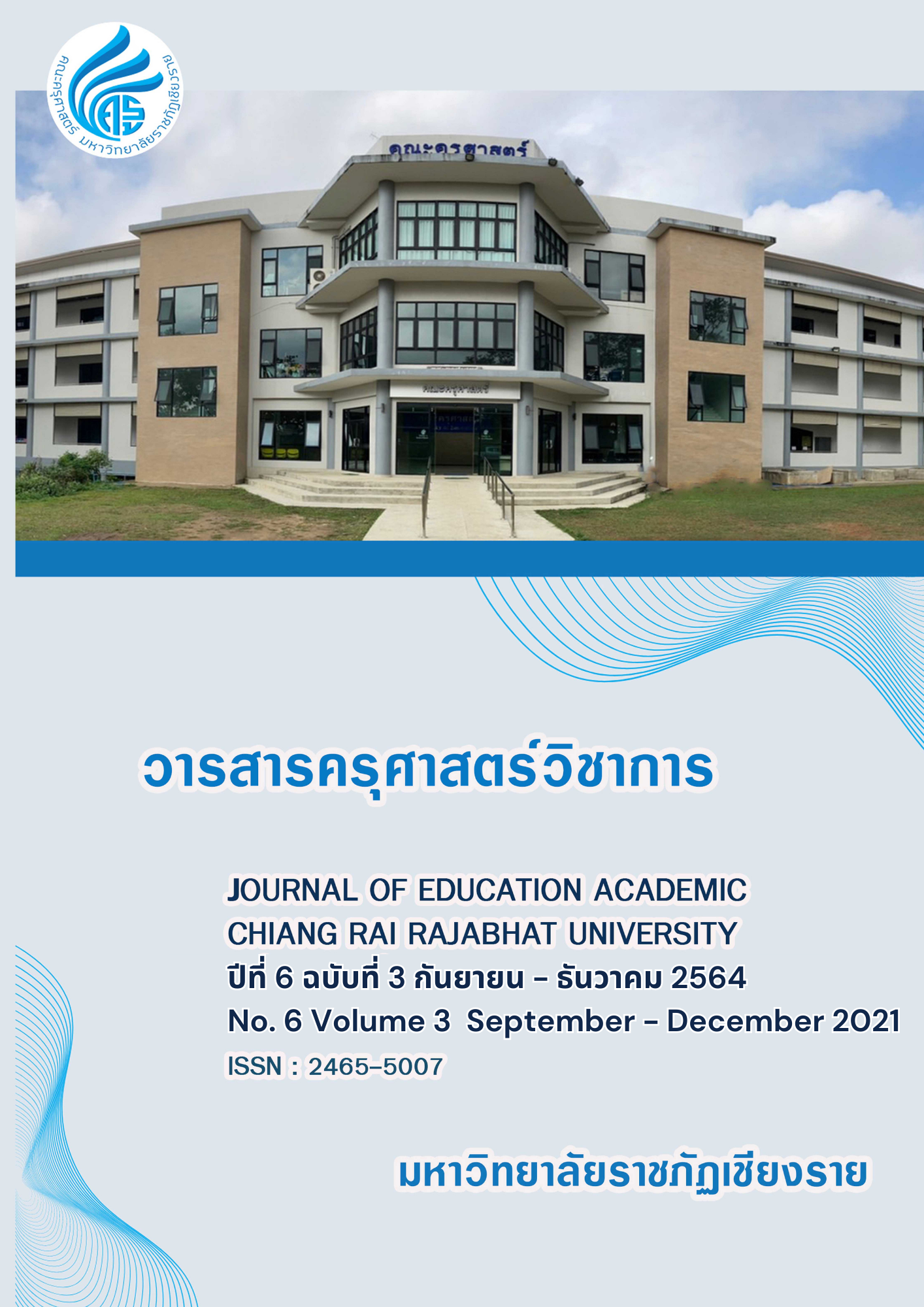The Development of School Administration and Management Strategies Using Information Technology of Maelaowittayakhom School
Keywords:
Strategy Development, Administration and Management of School, Information TechnologyAbstract
This Participatory Action Research (PAR) aimed to answer 4 objectives
(1) to examine the school administration and management circumstance; (2) to investigate key factors affecting the quality of school administration and management; (3) to explore the future scenario of school administration and management based on information technology;
(4) to develop administration and management strategies based on information technology. The study employed Appreciation-Influence-Control (AIC) Workshop which recruited 9 participants including 1 school administrator, 5 supervisors, and 3 teachers. The data was calculated for percentage, content analysis on cause and effect summary for developing the strategic administration guidelines. The results showed that:
The vision of school administration and management of Mae Lao Wittayakhom School is committed to developing learners’ quality comparable to international standards, having career skills according to the philosophy of sufficiency economy by adhering to the principles of management based on information technology following quality system to create innovation for learning. The mission is defined as (1) Promote and develop learners’ comparable to international standards. (2) Promote and develop learners to have basic occupational skills.
(3) Promote and develop learners to live according to the philosophy of sufficiency economy.
(4) Promote, support and develop educational institutions by adhering to the principles of quality management. (5) Promote, support and develop the use of information technology in learning management and administration. The goals setting involves (1) the learners have the ability to read, write, communicate and do numeracy. (2) learners attain analytical thinking skills, think critically, discuss and exchange ideas, solve problems. (3) Learners are able to create innovations that benefit themselves and able to disseminate them for the benefit of society. (4) Develop the learners to have the ability to use information and communication technology. Correctly and appropriately aware of the impact that will cause on oneself and society. (5) Learners have academic achievement according to the school curriculum. 6) Learners have basic skills and good attitudes towards their jobs. (7) The students attain desirable characteristics and values as specified by the school. (8) Learners have their pride about their local and Thai identities.
(9) Learners accept to live together amid differences and diversity. 10) Learners have good health physically and psychologically. (11) Have clear goals, vision and missions set by the school.
(12) Have a quality management system for school. (13) Carry out academic development work that focuses on quality of learners in all aspects according to the curriculum, schools and all target groups. (14) Develop teachers and staff to have professional expertise. (15) Provide physical and social environments conducive to quality learning management. (16) Provide hardware, software and media supporting the use of information technology systems, learning resources that facilitate learning and management. (17) Teachers deliver learning management by means of thinking processes, real practice, and can be applied in real life. (18) Teachers deliver positive learning management. (19) Teachers systematically monitor and evaluate learners. (20) Teachers exchange learning and provide feedback to develop and improve learning management. And, the strategic issues for project planning were proposed. Strategy 1: Develop learners’ quality comparable to international standards. Strategy 2: Develop learners’ basic professional skills. Strategy 3: Develop learners to live according to the sufficiency economy philosophy. Strategy 4: Develop the school adhering to the principles of quality management. Strategy 5: Develop the use of information technology in learning management and administration.
References
จินตนา จุงใจ. (2560). แนวทางการพัฒนาการใช้เทคโนโลยีสารสนเทศในการบริหารการศึกษาโรงเรียนประถมศึกษา สังกัดสำนักงานเขตพื้นที่การศึกษาประถมศึกษาพระนครศรีอยุธยา เขต 2. (วิทยานิพนธ์พุทธศาสตรมหาบัณฑิต). มหาวิทยาลัยมหาจุฬาลงกรณราชวิทยาลัย. พระนครศรีอยุธยา.
ณพิชญา เพชรพิมล. (2558). อุปสรรคในการบริหารจัดการโรงเรียนนิติบุคคลในกำกับของสำนักงานคณะกรรมการการศึกษาขั้นพื้นฐาน. วารสารศิลปากรศึกษาศาสตร์วิจัย. 7(2), 132.
พิสัณห์ นุ่มเกลี้ยง. (2558). กระบวนการทบทวนประเด็นยุทธศาสตร์. สืบค้นเมื่อ 27 ตุลาคม 2563, จาก https://www.youtube.com/watch?v=XoUIV2k6svY
วราภรณ์ แป้นแจ้ง. (2559). กลยุทธ์การบริหารเทคโนโลยีสารสนเทศและการสื่อสารสำหรับโรงเรียนมัธยมศึกษา. (วิทยานิพนธ์ปรัชญาดุษฎีบัณฑิต). มหาวิทยาลัยศิลปากร. กรุงเทพมหานคร.
สมานิศ วิจิตร. (2561). ความหมายของยุทธศาสตร์. สืบค้นเมื่อ 30 ตุลาคม 2563, จาก http://gg.gg/mv0ax
สุทธิศักดิ์ นันทวิทย์. (2558). รูปแบบการบริหารสถานศึกษาขั้นพื้นฐานในศตวรรษที่ 21 ของสำนักงานเขตพื้นที่การศึกษามัธยมศึกษาเขต 2. วารสารการบริหารการศึกษา มหาวิทยาลัยศิลปากร. 6(1), 214 – 226.
Downloads
Published
Issue
Section
License
Copyright (c) 2022 Journal of Education Academic Chiang Rai Rajabhat University

This work is licensed under a Creative Commons Attribution-NonCommercial-NoDerivatives 4.0 International License.






